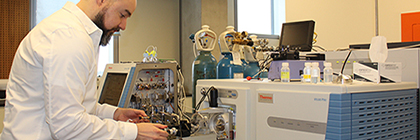Science Unplugged, a learning and social event series that features diverse presentations by members and associates of the Faculty of Science, ran successfully on March 6 at York University’s Keele campus.
Approximately 95 people attended the event, including industry representatives, faculty members, staff, graduate students and postdocs, to foster cross-departmental interaction.
Faculty of Science Dean Ray Jayawardhana welcomed all of the attendees and introduced Matt McGrath as the first speaker.
McGrath, who is the Faculty of Science communicator in residence and a correspondent with the BBC, specializes in reporting stories focused on the environment. His talk, “Cheating the Atmosphere – How Scientists Almost Scuppered an Important Story,” was about a BBC World Service radio investigation into the world of carbon accounting that uncovered important evidence of cheating by rich and poor countries alike.

The talk was followed by a presentation from Department of Chemistry Professor Derek Wilson, who shared details about the new York Science Core (YSciCore) facility. It is the Faculty of Science’s core analytical facility for microscopy, nuclear magnetic resonance (NMR) and mass spectrometry (MS), with the mission to support the scientific excellence of research programs.
“We were very happy to have the chance to showcase YSciCore’s world-class expertise and cutting-edge technologies,” said Wilson. “These services and tools are now available to any York researchers who want to make advanced analysis part of their research plan. We expect that YSciCore will play a crucial role in advancing York’s mission of enhanced research intensivity.”
The centre’s NMR specialist, Howard Hunter, was introduced next to explain NMR, which is commonly regarded as a method for identifying molecular connectivity and structure. Faculty of Science microscopy specialist Magdalena Jaklewicz also spoke to participants, and led a dynamic imaging portion of the YSciCore facility tour.
Jaklewicz took participants through the path to explore how microscopy has migrated from recording topography to gentle and dynamic multidimensional studies.

The YSciCore tour concluded with a presentation and tour by Peter Liuni, the centre’s MS specialist, titled “High Resolution Science at 1/1000th the Mass of an Atom.”
MS is the science of measuring atomic or molecular ion mass, and in a matter of decades, it has evolved from the analysis of small-molecules to characterizing the entire proteome of a species. Liuni’s presentation highlighted the monumental developments in MS that led to the exciting new MS technologies available at the YSciCore facility.


